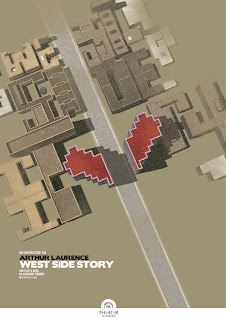What's the difference between a musical and a play without music? Is that a dumb question? The answer is so obvious, right? It's music. But it's actually more complex than that. The whole answer is that the difference between a musical and a play without music is the intensity of emotion. Music is an abstract language that communicates emotion better than words alone ever can. That's why West Side Story will always be more powerful than Romeo and Juliet. (And also because West Side Story fixes a couple of big plot holes in R&J.)
It's the same reason why movies use underscoring for emotional scenes and why commercials use jingles. Words convey information; music conveys emotion, quite often emotion that simply cannot be adequately expressed any other way.
It's also the secret to writing a successful musical, a secret too many people writing musicals these days don't know about... The best way to predict whether a new musical will be successful is to look at whether or not the story is primarily an emotional one. Evil Dead, Debbie Does Dallas, and Silence! are not emotional stories, so their musical versions didn't really work that well. On the other hand, Ragtime, Hedwig and the Angry Inch, Floyd Collins, The Light in the Piazza, Bat Boy, Rent, Spelling Bee are all primarily stories about human emotion, so they all made amazing musicals. You can look back over the history of the art form to see how well this litmus test works -- Carousel works, but not Call Me Madam. Guys and Dolls and Gypsy work, but not Anyone Can Whistle. Evita and Jesus Christ Superstar are wonderful; Starlight Express sucks. Sunday in the Park with George is a masterpiece; Pacific Overtures not so much.
Now hang on, I hear you yell... What about all those cynical but successful satires like Threepenny Opera, Of Thee I Sing, How to Succeed in Business Without Really Trying, and The Cradle Will Rock?
And Urinetown!!
True, the love stories in these musicals are superficial and silly. But that doesn't mean the shows don't have emotion -- love isn't the only emotion, after all. These social commentary shows (we can add Assassins, Hair, Chicago, and lots of others to the list) trade in powerful emotions other than love. They give us political passion, anger, empathy, triumph, revulsion, maybe even despair...
In some of these satirical musicals, our emotions are even used against us in powerful and/or funny ways. We fall in love with Velma and Roxie in Chicago, and then at the end, the show slaps us across the face by reminding us that these charming, funny women are heartless murderers! In Urinetown, we get all wrapped up in the Rebels' Righteous Cause, and then at the end, the show points out to us how wrong-headed that cause actually is... and we become the target of the satire ourselves!
But my theory still holds true. It's the emotion of "Look at the Sky" and "Run, Freedom, Run," the thrill of optimism and joy and promise, that keeps us involved. No matter how much the show tweaks us, mocks us, assaults us, there is still the emotion of great music that keeps us on board. It's a fundamental principle of musical theatre.
And it's why musicals are better than plays. (And don't post comments arguing with me on that point -- I'll just delete them....)
Long Live the Musical!
Scott
Subscribe to:
Post Comments (Atom)








0 comments:
Post a Comment